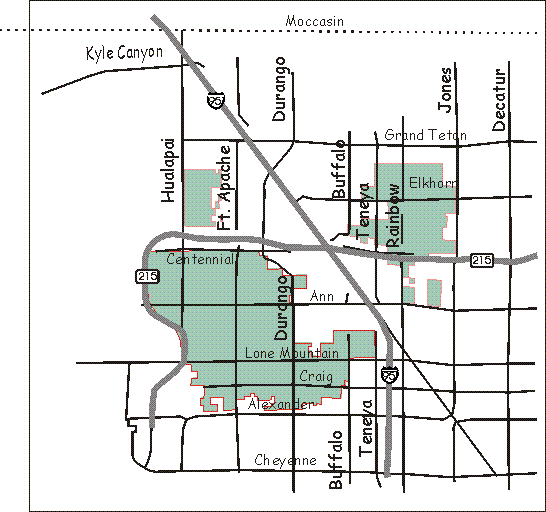
The Rural Neighborhood Preservation areas (RNPs) are a set of Neighborhoods located around the city with zoning designed to maintain a rural enviroment.
Here is a typical example...

The largest group are located in the Northwest and include the largest RNP at the foot of Lone Mountain ...

The primary attribute of the RNP is a zoning that allows no more than 2 homes per acre of land. There is commonly a four home cul-de-sac on 2.5 acres. Other configurations exist and there are neighborhoods with 1 acre and larger parcels mixed among the half acres.
The RNP areas involve more than low density. Rural roads without sidewalks, curbs or streetlights are generally standard. The roads within the developments are often private and are paved only by the homeowners.
The thought was to maintain neighborhoods where a rural life style could be maintained. Horses and other animals are generally allowed. Free roaming peacocks occur.
In the end though economics may well change the nature of these neighborhoods. The rise in land values has made the 1800 square foot starter home on a half acre unfeasible. After spending $300,000 for the land it is hard to put up a small home. It is going to be hard to keep your roping rink when the land involved is worth a million dollars.
In reality the true cowboys are going to have to head for Pahrump or the Sandy Valley. They are pretty well priced out of the Northwest.
Wells and Septic Systems
Many of these homes are on wells and have septic fields. This system works reasonably well in the Northwest though there are a few areas where wells are not practical. If you have a well hang on to it. The water quality is at least as good as the municipal systems and the cost is a great deal less. While attempts to reduce wells and encourage hook up to the purveyors will continue it makes little sense for a homeowner to agree to hookup unless confronted by a well failure.
Contrary to popular belief it is still possible to drill a well in the Northwest. The requirement is that municipal water not be close by. Various restrictions require an acre to drill a well but if you can it is likely a wise thing to do. The rules on domestic wells are very favorable to the homeowner...and present trends indicate the value will continue growing. Those with two acres or more should consider a guest house and a second well. It will turn out to be a very wise investment in the long term.